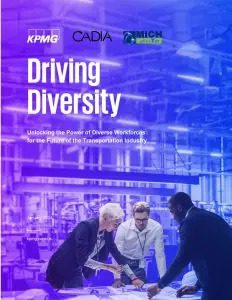
From top to bottom: Cheryl Thompson, Margaret Baxter, and Drew Coleman
“Diverse talent has long been underestimated and underutilized,” said Cheryl Thompson, Founder and Chief Executive Officer of the Center for Automotive Diversity, Inclusion, and Advancement (CADIA), in an interview with the Detroit Regional Chamber.
Thompson was joined by CADIA’s Executive Director Margaret Baxter and MichAuto’s Senior Director Drew Coleman, all offering insight into the relationship between the two initiatives, the creation of the CEO Coalition for Change, CADIA’s recent diversity, equity, and inclusion (DEI) study, and the importance of diversity in the automotive and mobility industry.
CADIA’s Efforts to Diversify the Automotive and Mobility Industry
Thompson launched CADIA in 2017 to diversify the automotive and mobility industry after spending her entire career observing its lack of non-white male representation at all levels. She saw this as an entry-level worker at Ford Motor Company, a tool and die apprentice, and an executive at American Axle and Manufacturing.
Baxter applauded how Thompson took action instead of being complacent, which she finds important for two reasons:
- Without full inclusivity, the industry’s opportunities to flourish are restricted.
- Without diversity, companies fail to tap into the full spectrum of available talent, potentially missing out on the “best and the brightest.”
“The automotive industry gave us really important careers that let us raise our families, and it paid well and [gave] lots of opportunity,” Baxter said. “[But] if an industry is white male-dominated and a lot of people don’t even consider it as a career, then that sort of cuts off that access to economic opportunity.”
Since its inception, CADIA has been a member-driven organization that serves approximately 80 businesses in the Detroit Region. It offers a variety of opportunities for them to engage, plus ample resources to improve their DEI efforts within their own organizations, such as:
- Monthly roundtables that share DEI best practices and lessons.
- Rev Up 2030, which addresses CADIA’s mission to double its number of diverse members by 2030.
- Annual CADIA Impact Awards, which recognize organizations doing “standout work on the 4Cs,” including leadership commitment, winning cultures, creating career paths for all, and systemic change.
- A DEI accelerator program to train leaders in developing and leading the next generation of leaders, according to Thompson.
- Consulting and workshops to “get inside a C-suite and do an executive-level set with the leaders because we believe the work has to start from the top,” according to Thompson.

Photos from Rev Up 2030, featuring Lottie Holland from Stellantis.
CEO Coalition: Diving Into CADIA and MichAuto’s Partnership
Another part of CADIA’s efforts is its relationship with MichAuto, an automotive and mobility industry organization within the Detroit Regional Chamber. This relationship began in 2019 when Thompson met MichAuto Executive Director Glenn Stevens Jr.
“We had some really good early discussions about ‘wow, this is what the industry needs. We need the industry to look like the communities that are around us’ – Glenn is always saying that,” Thompson said. “Glenn has always been a champion. I consider him such an advocate for the industry.”
Baxter echoed Thompson’s sentiments, sharing that Glenn and MichAuto being “in lockstep” with CADIA’s philosophies and business goals and “[Glenn’s willingness] to do whatever it took to help stand us up” was essential to growing their organization in 2019 and 2020.
“Back in 2019, we were a lot smaller, and we were still trying to really get some traction,” Baxter said. “I think it’s turned into a really great partnership where we didn’t always know exactly how we could work together, but we knew that we wanted to work together and support each other.”
The COVID-19 pandemic marked a pivotal point for what would soon become one of the automotive and mobility industry’s strongest partnerships.
After exploring companies’ concerns about getting their employees back into the office safely, Thompson launched “CADIA Connects” to offer its members a community and support to those who felt isolated working from home.
The focus of “CADIA Connects” expanded in 2020 after a conversation Thompson had with a CADIA member about the lack of support they felt from the business community following the death of George Floyd.
“As you can imagine, it was pretty raw and emotional,” Thompson said. “[But] we felt like we had the voice of the employee.”
That new realization inspired Thompson to connect with Stevens about leveraging MichAuto to share employee feedback with chief executive officers.
“Us getting access to those top leaders, those CEOs, was really key to establishing and strengthening that relationship we had,” Thompson said.
With their new partnership, CADIA and MichAuto hosted three roundtables with automotive chief executive officers, getting their perspective on the issues raised in “CADIA Connects” – particularly on why they were not making public statements about Floyd and racial justice.
One of the most important revelations made during those roundtables was that these conversations needed to continue, and that is when the CEO Coalition for Change was born.
“It’s a natural fit for a lot of our investors and partners because there are companies looking for that outlet. They’re like, ‘we don’t know who to call on when we have these types of challenges,’” Coleman said. “It’s not always natural for someone that’s not tasked with that role to try to solve that problem, and in 2019, there were far fewer DEI officers or similar roles than there are today. So that natural network of resource partners and peers didn’t exist yet.”
With the new founding members, the Coalition began developing and sharing DEI plans for internal and external operations. Thompson recalled one plan created by Chamber Board Member, MichAuto Board Chair, and GS3 Chief Executive Officer Lisa Lunsford that focused on the impacts chief executive officers can make themselves.
“She said, ‘there’s many organizations doing great work out there in health equity, insurance, banking, and lending, but what can I do as a CEO?’,” Thompson said. “And she said, ‘Well, I can affect jobs. I can affect attitudes, processes, and policies inside my company, which in effect creates jobs, community, economic stability, and sustainability. And that generational wealth creation, it’s all for that – there’s a linkage to social justice.”
Removing Excuses: Investing in Data to Forge Inclusive Change
 In 2023, CADIA and MichAuto partnered for a DEI industry study. MichAuto used its state-funded grant to support the study because, according to Coleman, “at MichAuto, we’re doing a lot of different things, and for us to try to do that on our own, it wouldn’t be the best match for our abilities. Partnering with CADIA and leveraging their strength in that space was really important.”
In 2023, CADIA and MichAuto partnered for a DEI industry study. MichAuto used its state-funded grant to support the study because, according to Coleman, “at MichAuto, we’re doing a lot of different things, and for us to try to do that on our own, it wouldn’t be the best match for our abilities. Partnering with CADIA and leveraging their strength in that space was really important.”
Thompson shared that the intent of the study was to remove excuses regarding industry diversification, as the study establishes key baseline data while providing DEI benchmarks and recommendations for improvement.
“The creation goes back to being able to remove excuses – people saying ‘I can’t find diverse talent; they don’t go into these technical fields,’” Thompson said. “We saw degrees in STEM from racial and ethnic minorities move from 38% in 2002 to 51% — a huge increase. That allows us to say, ‘Listen, we do have qualified people who have different backgrounds that can take these roles.’”
Some highlights from the study are:
- Diverse employees have higher representation in manufacturing and operations roles and are underrepresented in selling, general, and administrative expenses (SG&A) roles and leadership positions.
- 51% of STEM degrees were awarded to ethnically diverse individuals in 2021, but only 19-30% of salaried roles are held by racially and ethnically diverse workers.
- Racially and ethnically diverse employees are underrepresented in senior leadership and management roles (22%) relative to their representation in the industry (33%) and the overall U.S. workforce (38%).
- Women make up 24% of the workforce in the transportation industry but 47% of the overall U.S. workforce.
- Women are the most underrepresented in skilled trades and technical positions, with only 7% of craft workers and 18% of technicians identifying as female.
These are all things Baxter said she, her CADIA colleagues, and others in the industry already knew but that the data now backs up.
“All of us had this intuition that our industry is not diverse,” Baxter said. “I saw … where unconscious bias came into some of the decisions … Intuitively, I knew all of this was happening, but we couldn’t show that. We wanted data that would tell us where we are as an industry and give us a roadmap to where we want to go.”
Coleman agreed with Baxter, sharing that MichAuto values the importance of having the data to positively shape the industry and that opportunities for anyone should be equally available.
“At our core, we believe that our industry is diverse. That’s why it was so important for us to partner through our state funds and empower CADIA and KPMG to accomplish the study that they did,” Coleman said. “Because it’s one thing to say what we believe and say what we hear, but we can back that up with data and be able to forge a path forward for change using that data.”
Stevens agreed, stating: “We cannot effect change in the diversity and cultural richness of our industry without the work of organizations like CADIA. The MichAuto team has long been committed to building a robust, diverse, and inclusive human capital supply chain for our industry. When we have people like Cheryl and her team to collaborate with, it strengthens and enables our work and builds synergy that will lead to a stronger industry that is driven by it’s most important asset – our people.”


